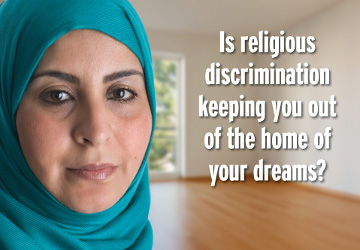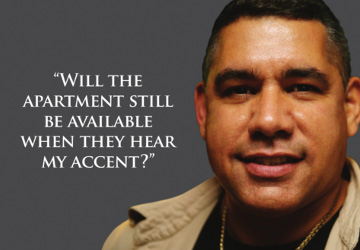Learn about Fair Housing Topics
Familial Status
All parents want the best for their children. Federal, state, and local laws protect families with children so that every parent has the right to choose where to raise their child. This protection is for all families with children under the age of eighteen, which includes pregnant women and parents in the process of adopting or securing custody of a child regardless of marital status or number of children. Click here to learn more.
Race
Passed shortly after the assassination of Dr. Martin Luther King in 1968, the Federal Fair Housing Act prohibits housing discrimination based on race. Since then, the vast majority of fair housing cases based on race have been brought by or on behalf of African-Americans. Prohibited acts include, but are not limited to, outright refusal to rent to a black family or apparently neutral policies that actually cause harm to a particular racial group. The spirit and letter of the Fair Housing Act is to promote the advancement of the equal housing opportunity for all races, and a celebration of the richness of diversity in residential life. Click here to learn more.
Religion
The intent of the Fair Housing Act is to ensure that all persons have access to housing where they can exercise their right to worship or not to worship as they choose. Even faith-associated housing communities, such as assisted living facilities, though they may state their affiliation with a particular faith, are required to accept qualified residents of all religious faiths into their communities. Click here to learn more.
Disability
Many people with physical and mental disabilities experience barriers to equal housing opportunities. These barriers can take the form of apartment buildings refusing to rent to individuals with emotional support animals or guide dogs due to “no pets policies” or even the construction of a building with limited access for wheelchair users. If you are a person with a disability experiencing housing discrimination, HOPE can help. Click here to learn more.
National Origin
Discrimination because of a person’s name, appearance, accent, or participation in customs being associated with nationality is illegal. That includes a person being incorrectly perceived as a certain nationality or because they associate with people of a particular national origin. While limited English proficiency is not one of the seven categories protected under the Fair Housing Act, denying housing to those who speak other languages can be just another way of discriminating on the basis of national origin. Furthermore, a person’s immigration status does not affect his or her federal fair housing rights or responsibilities. Click here to learn more.
Sex
Discrimination based on sex may be because you are male or female (though women are vastly more affected) because you are being sexually harassed in your housing, because you are pregnant, be in response to your being a victim of domestic violence, or even because of your gender identity. Any of these or other reasons why you might be discriminated against on the basis of sex are illegal and we can help. Click here to learn more.
Color
Prohibited housing discrimination may involve differential treatment based on a person’s skin color, shade, or tone, even within the same racial or ethnic group. While “color” is a separate protected characteristic, many race-based claims either were or could have been brought based on color. There is often a “blurring” of race-based cases. In addition to color, many race cases also involve issues relating to national origin – another protected class (see above). Click here to learn more.








